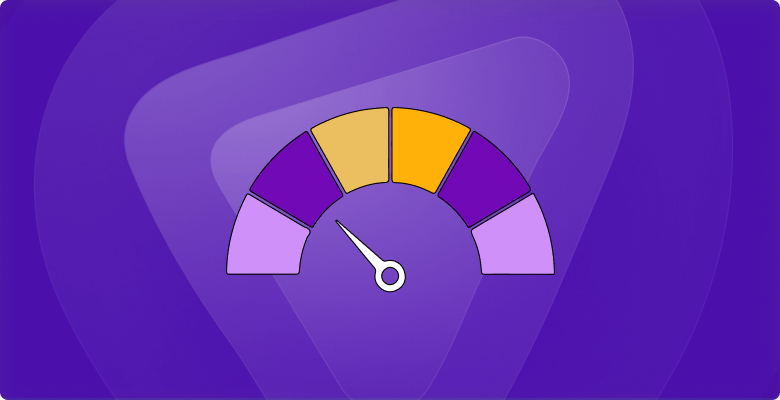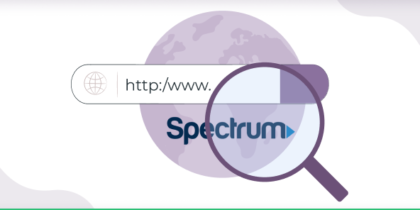Internet throttling is very frequent on smartphones and other wireless devices, but not very popular with cable and fiber. The only method to genuinely test internet throttling is through using a VPN service. You can simply follow the steps given below to see if your internet is being throttled.
- Run an internet speed test
- Download a Virtual Private Network
- Run a second speed test to differentiate test results
If your network is somehow being throttled, your speed will drastically improve once you install a reliable VPN service. If you don’t notice any considerable change, then there are other reasons causing sluggish internet speed.
Internet bandwidth is never limited to you. Your cellphone towers are disseminating signals across a range of devices at the same time. For this reason, some internet service providers may limit your speed or limit your usage speeds without informing you, allowing other users to connect to their towers.
Typically, Internet Service Providers only throttle when they consider that you are a heavy internet user. A regular user will never experience network throttling. If your internet is slow then there are some other reasons behind it and is advisable to contact your support agent to fix your issue
It might be sometimes frustrating to run a speed test and see that you are getting low internet speeds than what you would have bought it. The question arises are you being throttled? Or is it some other prevailing issue?
What is Data Throttling?

Throttling is the process of an Internet Service Provider (ISP) automatically slowing down without you even knowing. Sometimes you will be experiencing slow data transmissions speeds through; your equipment may not be at fault here.
Internet service providers are restricted to inform their users that their data is being throttled due to some rules and regulations, so the uncertainty behind a sluggish internet connection can be quite stressful for you.
Presently, you will usually see throttling through your entire network connection. Some people worry that their data might be throttled over the network, but this is just a common issue with no need to fear.
Why do ISPs throttle data?
Are you wondering why my data is being throttled? There are many reasons why your Internet Service Provider might be throttling your data, resulting in internet throttling.
- You have used your data limit
Many users might have limited data so when their data limit has been reached; the ISPs are likely to slow down their internet. You will see your internet speeds drastically reduced, instead of your internet service completely shutting off. The slower speeds can be annoying, but it’s better to have an internet connection completely shut off
- You are connected during heavy traffic time
While bandwidth may certainly not be an issue for major internet service providers, the fact remains that it is a limited resource. With extremely heavy data usage, ISPs can cut-off your bandwidth to allow other internet users to receive high speed.
- Your ISP is choosing to throttle your specific activity
The competency of an ISP to throttle may be extended, adding the ability to limit your internet speed to heavy data users such as those who are streaming videos on Netflix or some other heavy data using services. If the costs of the ISPs are increased towards their end, you might end up paying those extra costs to resume using their data services
How to tell if your Internet is being throttled?
You can find out if you are a victim of ISP throttling using the following methods:
Method #1: Take an internet health test
One of the best ways to determine if you are experiencing internet throttling is by taking the free Internet Health Test from Battle for the Net.
This test examines your connection for potential degradation by sending internet traffic outside of your internet service provider’s (ISP) network and comparing the resulting speeds.
By conducting this test, you can assess whether your ISP is intentionally slowing down your internet speeds, providing valuable insights into the quality of your connection.
Method #2: Conduct a blocked ports test
Just follow these simple steps:
- Visit WhatsMyIP.org.
- Click Port Scanners under the Networking Tools category.
- Choose the appropriate test based on your needs and requirements.
- If you observe a port labeled as “Rejected” you could be a victim of throttling.
Method #3: Run an internet speed test
Running an internet speed test with and without a VPN enabled is another way to check if your ISP is throttling your connection. All you have to do is:
- Go to Speedtest by Ookla.
- Click the Go button.
- Once the results are in, write down your upload and download speed along with ping on a piece of paper.
- Now, connect to your VPN.
- Take the speed test again.
- If you are getting faster speeds with the VPN turned on, you are being throttled.
What are some common signs of ISP throttling?
When assessing for potential internet throttling, you need to watch out for these common signs:
- Blocked or Nonfunctional Websites: If you encounter websites that are inaccessible or not functioning correctly, it could indicate possible throttling measures.
- Slower Download Speeds: If you notice a significant decrease in your download speeds compared to what you typically experience, it could be an indication of throttling.
- Variable Website or Service Speeds: If you observe that specific websites or online services are consistently slower than others, it might suggest targeted throttling of certain types of traffic.
- Buffering or Lagging Videos: If videos continuously buffer or experience lags, especially on platforms that usually provide smooth playback, it could be a sign of throttling affecting streaming services.
- Overall Slower Internet Speeds: If your internet speeds are consistently slower than what you expect, it may be worth investigating if throttling is the cause.
- Unstable Wi-Fi Connection: If your Wi-Fi connection is frequently choppy or unreliable, it could indicate interference from throttling or other network issues.
Which ISPs practice throttling?
The real question would be which ISPs do not indulge in throttling? Here are some ISPs known for throttling user bandwidth:
- Comcast (Xfinity)
- AT&T
- Verizon
- Cox Communications
- Spectrum (Charter Communications)
- CenturyLink
- T-Mobile (specifically for mobile data)
- Rogers Communications (Canada)
- Bell Canada
- Telus (Canada)
Other reasons why your internet might be slow
Slow internet can be caused by various factors besides ISP throttling, such as:
- Network congestion during peak hours.
- Browser maintenance, like software updates.
- Having too many open tabs.
- Engaging in high-bandwidth activities like video chatting or streaming.
- Outdated modem or router.
- Wi-Fi usage instead of Ethernet, which is generally faster.
How to fix data throttling
There are a couple of steps involved in how to fix or stop throttling issues
- Monitor your monthly data usage: if you’ve exceeded your data limit and not aware of it, then you might want to head to your smartphone settings and set the data usage limit. Smartphones now can warn you of the data limit before if finishes. If you feel that you need some extra data then you would want to purchase a higher data limit package to avoid throttling issues
- Buy a reputable VPN: a popular and reliable VPN may be able to provide you with a solution. If VPN doesn’t solve your issue then follow the next two steps given below. Now, video streaming services such as Netflix and Hulu are becoming intelligent to detect if you are on a VPN and may restrict you from utilizing their services
- Switch to a new internet service provider: some ISPs are more aggressive when it comes down to exceeding data usage and slowing down internet speeds respectively. Every ISP has a different cap in its terms and conditions. If you think you are constantly being throttled, you may want to sign with another ISP that has a significantly higher data bandwidth.
Inform your government representative: if all the above solutions don’t work out for you so the last resort would be to inform your government to provide open internet access. By submitting your concerns and contacting your congressperson, you can add your right to have content prioritization and fight against internet throttling.
Frequently Asked Questions
Will a VPN stop throttling?
Using a Virtual Private Network (VPN) can potentially stop your ISP from throttling your internet connection. A VPN encrypts your internet traffic and routes it through a remote server, making it difficult for your ISP to identify and throttle your traffic.
How to stop throttling?
You can stop your ISP from throttling by using a VPN, which will hide your IP address and online activity. To use a VPN:
- Choose a VPN.
- Download the VPN from the app store.
- Sign in.
- Connect to a server.
Is ISP throttling legal?
The legality of Internet Service Provider (ISP) throttling varies depending on the country and the circumstances. In some cases, ISPs may be legally allowed to throttle or slow down internet traffic in order to manage network congestion or to enforce their policies. However, in other cases, throttling may be considered illegal or against net neutrality laws.



